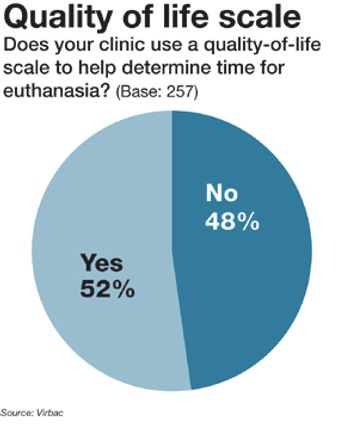
Dallas - Almost half of veterinarians surveyed are having end-of-life discussions with pet owners more than 11 times per month.

Dallas - Almost half of veterinarians surveyed are having end-of-life discussions with pet owners more than 11 times per month.

National Report - The bond between people and their pets has been well-documented, but in certain segments of the population, the trend goes deeper ... way deeper.

National Report - Only 30 percent of mixed-breed dogs are on monthly flea-and-tick medications, according to a new survey from Mars Veterinary.

National Report - While repots within the veterinary profession are signaling an alarm that visits are down, a new poll from the American Pet Products Association indicates that 16 percent of dog owners and 13 percent of cat owners say their pets' health takes as much priority as their own.
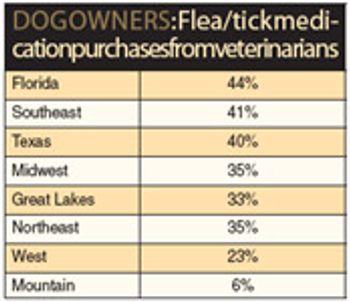
Just 37 percent of dog owners purchase heartworm medication from veterinarians.

As the cost of owning a pet-and running a veterinary practice-rises, more pet owners are turning to insurance to keep their animals healthy.

AABP says there is no shortage of veterinarians in most areas of rural food-supply.

Strategies to build employee engagement can help, veterinarians say.

Pet ownership and spending are up, but not enough to keep pace with a surge of new DVMs.

National Report -- The number of new veterinarians entering the market is up 2.92 percent over last year, with a total of 2,638 earning degrees from the nation's 28 veterinary colleges this spring.

National Report - While the Bureau of Land Management is going to increase attempts at using birth control to keep wild-horse populations in check this year, an internal report reveals that much more is needed to make the program sustainable.

Shifting societal perceptions, and a lot of money, fueling popularity.

National Report - Nearly one-third of the veterinary professionals surveyed don't typically bring their own cat in for an annual wellness examination.
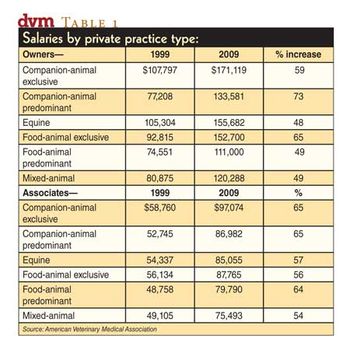
Male DVMs out-earning female colleagues; AVMA notes 4 percent increase overall.

A new study says the female majority may be keeping men out of veterinary schools.

National Report - In the last three years, James Dee, DVM, has seen visits steadily drop in his hollywood, Fla., practice. In fact, the appointment calendar is wide open. "Anybody can be seen within a day," he says.
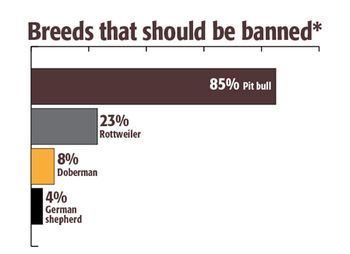
A new Associated Press survey finds almost three-quarters of Americans blame training for dog-bite culprits, not the dog breed.

National Report - Consumers still reeling from the economic fallout of the past few years continue to tighten their belts and rein in spending.

Toronto, Ontario - More than half of Canadian pet owners polled recently by Harris/Decima say animals are more reliable than people.

General practice remains at a crossroads; hastened by the economy, specialization

National Report - The number of dogs adopted from animal welfare organizations was flat over the last year, but cat adoptions increased 3 percent, according to recent figures from Pet Point, an animal management software ompany.
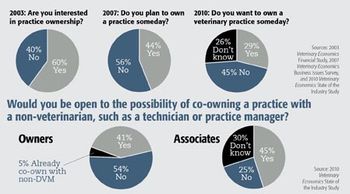
Three veterinary team members who are or have been part-owners reveal the challenges, benefits, and strategies for making it work.

Trend #1: The Recession, chapter 1 of a four-part web presentation by Dr. Karen Felsted, CEO of the National Commission on Veterinary Economic issues.

Your dog-owning clients are more likely to be high-ranking business leaders, according to a new Careerbuilder.com survey.

National Report - By 2020, one expert predicts hundreds of veterinarians to be working above the clouds.

Consumer demand for purebred and cross-bred puppies coupled with strict new domestic breeding laws is believed to be driving importation numbers higher and higher.

Researcher says men may take "preemptive flight" when they see mostly women in veterinary college classrooms.

Americans can expect continued slow growth for the economy, a kind of "zombie-like" performance, an economist reports.

Veterinary leaders plan a November meeting to carve out strategies to reverse the trend of dwindling client visits.

Dr. Marty Becker, Dr. Bruce Little, and more sound off on the future hurdles the profession will face